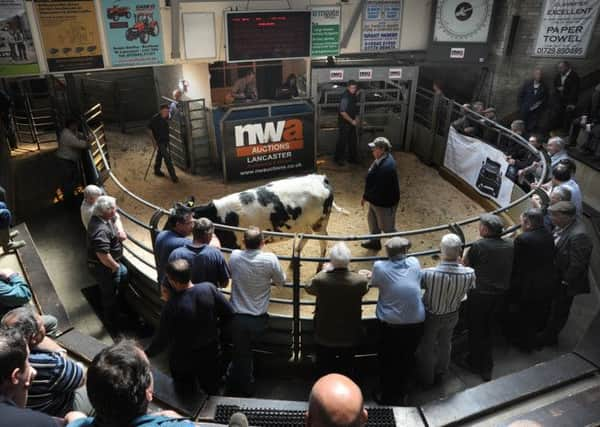Talking stock


The auctioneer’s eyes dart between two or three of the men leaning against the barrier around the auction ring.
Clearly, I am in the wrong place; behind them.
While auctioneer of 30 years Gary Capstick reads their subtle gestures with consummate ease, allowing the price to rise accordingly, I see nothing.
Advertisement
Hide AdAdvertisement
Hide AdWhat, I wonder, are they doing to convey their interest in one animal, but not the next?
In more than 40 minutes of bidding I spot only the twitch of one finger from a buyer; not a nod, not a shake of the head, nothing.
Bill Nelson, livestock manager with North West Auctions, laughs when I tell him and explains that nobody is really keen for anyone else to see what they are doing – bidding, selling, whatever. He looks around. “There won’t be many farmers actually buying,” he says. “A lot of the people round the ring are professional buyers working on behalf of farmers.” This is a reflection of mechanisation on the farm, which means fewer staff and fewer opportunities for a farmer to spend a day at the auction mart.
A full-time farmer himself until 2000, Bill moved into the auction business when he was 52. Now, his farm on the Scottish borders is managed for him. “I do miss farming, but I get involved at the weekend,” he says.
Advertisement
Hide AdAdvertisement
Hide AdHe is not surprised when I reveal that I haven’t been able to extract anything more than a Christian name from the Lancashire dairy farmer I have been chatting to.
The farmer – who tells me he is called Alan – is liberal with other information, however, and gives me chapter and verse during the sale of store cattle in the main ring at NW Auctions’ Lancaster base on Wyresdale Road. He enlightens me on cattle breeds – blonde D’Aquitane, Limousin, Angus, Hereford – and on what to look for in an animal when you are buying for beef.
“You don’t want too much fat here, on the belly,” he says, slapping his own stomach and pointing to a lean, muscular beast, a blonde D’Aquitane steer, which eventually sells for £1,080.
“And those are a bit on the small side for their age,” he says as five young animals enter the ring. “Now, look at this next lot, they’re younger but bigger, so they’ll fetch more.” He is right, they do and I’m impressed. He laughs. “They call it a stockman’s eye,” he says. “Even when I’m looking at my stock at home I can pick up when something’s wrong.”
Advertisement
Hide AdAdvertisement
Hide AdHe is selling five two-year old Holstein steers from his dairy herd and is hoping each one will fetch between £500 and £600.
He sympathises about my inability to understand auctioneer Gary, whose rapid-fire commentary gives away very little to a city girl like me; an occasional number maybe, the context of which is lost among many other numbers. “He’s like a calculator,” says Alan. “He can put a value on an animal as soon as it comes into the ring.”
This ability means that during the earlier sale, of cast cows – generally milkers that have come to the end of their useful life – each animal was in the ring for about 10 seconds as a supremely focused Gary clocked the bidders’ desire to add another few pence to the price per kilogram or to draw a line under their interest. In contrast, I was privy only to the animal’s weight, age and lot number, conveniently displayed for me on a digital screen above Gary’s head. And that was it; a rap from the wooden baton in Gary’s hand signalled an end to each sale and the cows were gone, out the other side to the waiting vehicles which, in this instance, were likely to be taking them to the abattoir.
I feel, briefly, as though I am getting the hang of things. I correctly identify a Limousin and make the right appreciative noises when I see a nicely muscled animal. “See,” says Alan, with a grin. “You’re getting a stockman’s eye already.” I doubt he is serious.
Advertisement
Hide AdAdvertisement
Hide AdBut then he is gone; suddenly up on his feet and with the briefest of goodbyes he disappears as his own animals enter the ring. I never have chance to ask him what they eventually fetch; I lost track of rapid-fire Gary at £500…